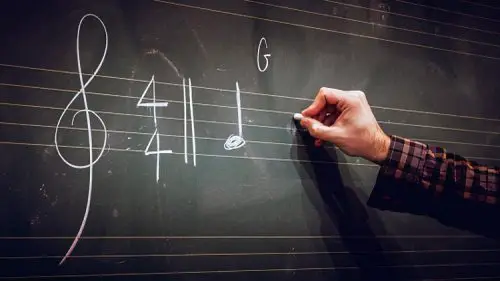Music theory is not the same for every instrument. While there are certain core principles and concepts that apply to all instruments, there are also specific aspects of music theory that are unique to individual instruments. Each instrument has its own unique characteristics, capabilities, and techniques, which influence how music theory is applied.
For example, different instruments have different ranges, timbres, and playing techniques. The way music is notated and interpreted can vary depending on the instrument. Instruments like the piano or guitar can play multiple notes simultaneously, while others like the saxophone or trumpet can only play one note at a time. This affects how chords and harmony are formed and understood on different instruments.
Additionally, the sheer physicality of playing an instrument can also impact music theory. Instruments like the violin or cello require a deep understanding of technique and finger placement, while instruments like the drums or percussion require a sense of rhythm and timing.
Moreover, the context in which an instrument is used can also influence the application of music theory. For example, music theory for a jazz ensemble will differ from that of a symphony orchestra or a rock band. Different genres and styles of music might have different conventions and rules regarding harmony, melody, rhythm, and improvisation.
Here’s a summary that sums up the entire article if you are too busy. Otherwise, read till the end because there are much more to the topic!
| Topic | Answer |
|---|---|
| Is music theory same for every instrument? | Music theory is not the same for every instrument; while there are core principles that apply universally, each instrument has unique characteristics that influence how music theory is applied. |
| Do you need music theory to play an instrument? | While it is not necessary to learn music theory to play an instrument, having a basic understanding can greatly enhance your abilities and deepen your musical understanding. |
| What can you use music theory for? | Music theory can be used to understand and analyze music, read and interpret sheet music, compose and arrange music, improvise, communicate with other musicians, and explore different genres and styles. |
| Which instrument is best for music theory? | There is no definitive answer, but instruments such as piano, guitar, woodwinds/brass, strings, percussion, and voice offer unique perspectives for learning music theory. |
| Can you apply music theory across different instruments? | Yes, music theory can be applied across different instruments as it provides a universal understanding of the principles that govern music. |
| Is it necessary to learn music theory to play an instrument? | No, it is not necessary to learn music theory to play an instrument, but it can greatly enhance your musical abilities and open up new possibilities for creativity and expression. |
| How can learning music theory improve my playing? | Learning music theory improves sight-reading skills, enhances improvisation and composition abilities, develops a sense of musical structure, refines ear training, and aids in communication with other musicians. |
| How can music theory benefit my musical career? | Music theory provides versatility, enhances songwriting and communication skills, improves sight-reading abilities, and sets you apart in auditions and academic pursuits. |
Do you need music theory to play an instrument?

You do not necessarily need music theory to play an instrument. Many musicians, especially those who are self-taught or play by ear, can learn to play an instrument without formal knowledge of music theory. In fact, some of the greatest musicians in history have had little to no formal training in music theory.
However, having a basic understanding of music theory can greatly enhance your abilities as a musician. It can provide you with a framework to understand and analyze the music you are playing. It can also help you recognize patterns, make connections, and develop a deeper appreciation for the music. Music theory can also help you communicate with other musicians, read and interpret sheet music, and improvise.
Learning music theory can also open up new possibilities for your playing. It can help you understand different scales, chords, and progressions, which can in turn allow you to explore different musical styles and genres. Having a solid foundation in music theory can also help you compose your own music, as you will have a better understanding of how different musical elements work together.
It is important to note that learning music theory does not mean you have to become a master in it. Even a basic understanding can go a long way in enhancing your musical abilities. There are various resources available, such as books, online tutorials, and classes, that can help you learn music theory at your own pace.
Ultimately, the decision to learn music theory as a musician is a personal one. While it is not essential, it can greatly benefit your overall musicianship and open up new avenues for creativity and expression.
Also Read: Usage Of Music Theory: Do You Need It To Play Instrument?
What can you use music theory for?
Music theory can be used for a variety of purposes in your musical journey. Here are some key ways in which music theory can be useful:
1. Understanding and analyzing music: Music theory provides a framework to understand the structure and components of music. It helps you analyze and make sense of the elements such as melody, harmony, rhythm, and form. By applying music theory, you can gain a deeper appreciation for the music you are playing or listening to.
2. Reading and interpreting sheet music: Music theory enables you to read and interpret sheet music accurately. It helps you understand the symbols, notations, and musical markings used in written music. This skill is particularly valuable if you want to play in an ensemble or learn music from written sources.
3. Composing and arranging music: Music theory forms the foundation for composition and arranging. It provides you with the knowledge of how different elements work together harmonically, melodically, and rhythmically. With a solid understanding of music theory, you can create original compositions or arrange existing pieces in different ways.
4. Improvising and jamming: Music theory can guide your improvisational skills by providing you with a toolbox of scales, chords, and progressions. This knowledge helps you make informed decisions and create cohesive musical ideas in real-time. It can also facilitate collaboration and jamming with other musicians.
5. Communicating with other musicians: Music theory serves as a common language among musicians. It allows you to communicate musical ideas and concepts more effectively. Whether you are discussing chord progressions, key changes, or specific musical techniques, having a shared understanding of music theory can facilitate smoother collaborations and rehearsals.
6. Exploring different genres and styles: Understanding music theory opens doors to exploring various genres and styles. It helps you recognize and appreciate the characteristics, conventions, and patterns of different musical genres. By applying music theory, you can adapt your playing style, experiment with different techniques, and broaden your musical horizons.
7. Teaching and mentoring: If you have a passion for sharing your musical knowledge, music theory is an essential tool for teaching and mentoring others. It allows you to explain concepts, guide students through their musical journey, and help them develop their technical and creative skills.
Also Read: Learning Guitar Without Chords & Theory: Is It Possible?
Which instrument is best for music theory?
There is no definitive answer as to which instrument is best for learning music theory. Music theory is a universal concept that applies to all instruments and genres of music. However, certain instruments may offer particular advantages when it comes to understanding and applying music theory concepts.
1. Piano/keyboard: The piano is often considered an ideal instrument for learning music theory. Its layout and visual representation of musical concepts make it easier to grasp fundamental concepts such as scales, chords, and harmonic relationships. The ability to play both melody and harmony simultaneously on the piano also allows for a deeper understanding of music theory.
2. Guitar: The guitar, with its versatile nature and portability, is another popular instrument for learning music theory. The guitar provides a hands-on experience with chords, scales, and progressions, making it easier to visualize and understand music theory concepts. The guitar’s fretboard layout also helps in understanding intervals and transpositions.
3. Woodwind/Brass instruments: Instruments such as the flute, clarinet, saxophone, trumpet, or trombone, require a good understanding of music theory to navigate their specific fingerings and techniques. Learning these instruments can enhance concepts of melody, scales, and articulation.
4. Strings instruments: Instruments like the violin, cello, or bass offer a unique perspective on music theory. The focus on pitch and intonation is crucial, requiring an understanding of scales, harmony, and chord progressions. String instruments can provide a deeper insight into melodic structure and phrasing.
5. Percussion instruments: While traditional percussion instruments like drums and xylophones may seem less focused on theory, rhythmic patterns and subdivisions are integral components of music theory. These instruments can help develop a solid rhythmic foundation and an understanding of time signatures, rhythms, and syncopation.
6. Voice: The human voice is an incredible instrument for understanding music theory as it involves direct vocalization of musical concepts. Singing can help internalize pitch, harmony, and melody, and develop aural skills such as sight-singing and recognizing intervals.
Ultimately, the best instrument for learning music theory depends on your personal interests, goals, and learning style. The instrument that resonates with you and motivates you to explore music theory concepts will be the most beneficial for your musical journey. Regardless of the instrument you choose, studying music theory actively and applying it to your instrument will deepen your understanding and improve your overall musical abilities.
Can you apply music theory across different instruments?

You can apply music theory across different instruments. Music theory provides a universal language and understanding of the principles that govern music, regardless of the instrument being played. The foundation of music theory remains the same regardless of the instrument, and the concepts learned can be transferred and applied across instruments.
The fundamental elements of music theory, such as pitch, rhythm, melody, harmony, and form, are applicable to all instruments. For example, the concept of scales and intervals applies to both the piano and guitar. The understanding of chords and chord progressions can be applied to instruments like the saxophone or trumpet. The study of rhythmic patterns and time signatures is relevant to both drums and piano.
Learning music theory on one instrument can actually enhance your understanding and proficiency on another instrument. The knowledge of theory gained on one instrument can be adapted and transferred to another instrument, creating a deeper understanding and fluency in music as a whole.
Moreover, understanding music theory across different instruments can facilitate collaboration and communication with other musicians. When playing in ensembles or bands, being able to speak the same musical language and comprehend concepts like key signatures, transpositions, or dynamics is crucial for a cohesive performance.
While the application of music theory is universal, it is important to consider the unique characteristics and capabilities of each instrument. Some instruments may have specific techniques, notations, or playing styles that require additional learning and understanding. However, the core concepts of music theory remain consistent and can be adapted to suit the specific requirements of each instrument.
How can learning music theory improve my playing?
Learning music theory can greatly improve your playing in several ways. By understanding the underlying principles and concepts of music, you can enhance your musicality, expand your repertoire, and unlock new creative possibilities.
1. learning music theory can improve your sight-reading skills. With a solid understanding of musical notation, key signatures, and rhythm, you will be able to read and interpret sheet music more accurately and efficiently. This opens up a wider range of musical pieces for you to play and enables you to learn new songs more easily.
2. Music theory provides a foundation for improvisation and composing. With knowledge of scales, chords, and harmony, you can create your own musical ideas and experiment with different melodic and harmonic structures. Understanding music theory also helps in recognizing patterns and chord progressions, allowing you to improvise solos or create accompaniments that fit well with the music.
3. learning music theory can help you develop a better sense of musical structure and form. You will start to recognize how different sections of a piece fit together and understand concepts like verses, choruses, bridges, and key changes. This understanding enables you to approach a musical piece with a more comprehensive perspective, making your interpretation and execution of the music more accurate and expressive.
4. Studying music theory enhances your ear training. It allows you to recognize intervals, chords, and melodic patterns more easily, which in turn improves your ability to play by ear. You will be able to listen to a piece of music and more quickly identify and replicate the notes and harmonies.
5. Learning music theory can help you communicate better with other musicians. It provides a common language and vocabulary that facilitates collaboration and discussion about musical ideas. When playing in ensembles or bands, being able to convey your musical thoughts and understand the ideas of others is essential for a seamless and cohesive performance.
Summary
In conclusion, while music theory may not be the same for every instrument, it is a valuable tool that can greatly enhance your musical journey. Whether you choose to dive into the intricacies of scales and chords or prefer to play by ear, having a basic understanding of music theory can open up a world of possibilities. It allows you to better analyze, communicate, and express yourself through music.
So, whether you’re tinkering on the piano, strumming a guitar, or blowing a saxophone, don’t be afraid to dip your toes into the realm of music theory. It may just be the secret ingredient that takes your playing to the next level. Embrace the nuances, embrace the harmony, and let music theory be your trusted companion on this melodious adventure. Happy playing!






